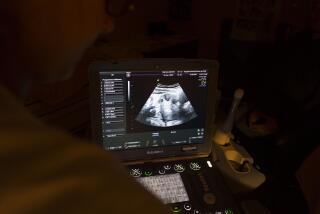Roos Seeks to Fight AIDS Through Blood Tests
- Share via
SACRAMENTO — Faced with a rising mortality rate among AIDS victims, Assembly Democratic Leader Mike Roos of Los Angeles proposed a two-part effort on Tuesday to reduce the risk of contracting the disease through blood transfusions.
The legislation, backed by public health officials, would set aside $3 million to provide testing for acquired immune deficiency syndrome in county health clinics to supplement testing at blood banks. It also would set up a system to protect the identity of those who submit to AIDS screening programs.
Ironically, the effort was launched because officials fear that more people may contract the disease through transfusions when a new AIDS test becomes available at blood donor centers. The disease destroys part of the body’s immune system, leaving it vulnerable to infection.
The Federal Drug Administration is expected to license the test next month and order its use in screening donors at blood banks nationwide. The accuracy of the tests is in dispute and public health officials in California are worried that high-risk people, who otherwise would not consider donating blood, may go to blood banks simply because they want to be tested.
Dr. Robert Benjamin, Alameda County’s chief of communicable diseases, said people might be motivated to give blood if the test fails to detect AIDS. Providing additional testing sites separate from blood banks, he added, could reduce the chance that high-risk individuals would donate.
“Without this bill, the public health departments would not have the funds to offer testing,” Benjamin said. “So people are stuck and would have to go to blood banks to get tested.”
The other major thrust of Roos’ measure is to make sure “there will be no AIDS blacklist” for those whose tests indicate that they have been exposed to the disease. Donors who test positive would be added to a confidential “deferred donor registry” similar to lists used to assure that those exposed to hepatitis and other infectious diseases cannot donate blood.
The list would be be legally protected from subpoenas and there would be criminal penalties for violating the confidentiality of test results, Roos said.
Roos, who was joined at a press conference by Benjamin and other AIDS specialists, said his proposal is the first of several he intends to introduce that would finance medical care for AIDS victims.
Nationwide, there have been about 7,800 diagnosed cases of AIDS; of those, 3,700 have been fatal. In California, the number of AIDS cases is doubling every nine months.
Most cases have been found among certain high-risk groups, particularly homosexuals. Researchers say, however, that they have strong evidence that the disease can be transmitted among the general population.
About 1.3% of AIDS cases are believed to have been contracted through blood transfusions.
More to Read
Get the L.A. Times Politics newsletter
Deeply reported insights into legislation, politics and policy from Sacramento, Washington and beyond. In your inbox twice per week.
You may occasionally receive promotional content from the Los Angeles Times.










